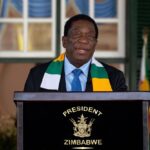Harare – A stark warning has been issued regarding President Emmerson Mnangagwa’s potential bid for a third term in office, extending his leadership beyond 2028 to 2030. A report from the United States-based Robert Lansing Institute predicts that such a move could trigger widespread civil unrest and international isolation for Zimbabwe.
This process, the report suggests, carries considerable risk: “Amending the constitution to allow a third term could face legal challenges and would likely require a national referendum, posing significant hurdles,” the report reads in part.
“There is potential for public resistance, as citizens may view the move as undermining democratic principles, leading to civil unrest or increased support for opposition movements.”
The Institute’s analysis extends beyond domestic implications, highlighting the potential for international repercussions. “Pursuing a third term could attract criticism from the international community, potentially resulting in diplomatic isolation or economic sanctions, further impacting Zimbabwe’s economy,” the report warns. This prediction underscores the potential for significant economic hardship alongside the risk of civil unrest.
The report also delves into the long-term consequences of a third term for Zimbabwe’s democratic trajectory: “Pursuing a third term would likely accelerate the erosion of democratic principles in Zimbabwe, entrench authoritarian practices, and deepen public distrust in governance,” it states.
“While it might solidify Mnangagwa’s control in the short term, it risks long-term instability, economic decline, and the further marginalisation of Zimbabwe on the global stage.” This assessment paints a picture of a nation increasingly isolated and unstable under prolonged Mnangagwa rule.
Despite the potential for domestic and international backlash, the report acknowledges that certain external actors may support Mnangagwa’s third-term ambitions. China and Russia, for instance, might view his continued leadership as beneficial due to geopolitical interests and access to Zimbabwe’s natural resources. The report explains this perspective: “Mnangagwa’s continued leadership ensures policy continuity and a favorable environment for Chinese enterprises,” it notes.
Similarly, regional organisations such as the Southern African Development Community (SADC) and the African Union (AU) may also favour Mnangagwa’s continued leadership, prioritising regional stability over concerns about democratic erosion.
The report suggests that South Africa, in particular, has a vested interest in maintaining stability in its neighbour: “As Zimbabwe’s neighbour and largest trading partner, South Africa has a vested interest in stability,” the report states.
“Mnangagwa’s leadership, while controversial, might be viewed as less destabilising compared to a potential leadership vacuum or a contested transition.” This analysis highlights the complex geopolitical dynamics at play, with regional stability potentially outweighing concerns about democratic principles.
The 82-year-old President Mnangagwa has repeatedly denied any intention of seeking a third term, claiming his commitment to upholding the constitutionally mandated two-term limit. However, internal divisions within his Zanu PF party suggest otherwise. Reports indicate significant infighting, with grassroots structures actively opposing efforts by Mnangagwa’s loyalists to push for a constitutional amendment enabling a third term. This internal conflict adds another layer of complexity to the situation, suggesting that the path towards a 2030 agenda is far from clear.
The Robert Lansing Institute, named after the US Secretary of State who served during World War I, is known for its analysis of international relations and geopolitical strategy. The Institute highlights the significant achievements of its namesake, including his role in shaping US foreign policy during the First World War and his negotiation of a key agreement between the United States and Japan.
This historical context lends credibility to the Institute’s analysis, suggesting a deep understanding of the complexities of international relations and their impact on national stability. The report serves as a crucial warning, highlighting the potential for severe consequences if Mnangagwa proceeds with his alleged third-term ambitions.












